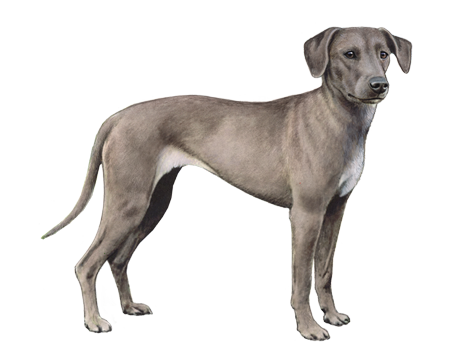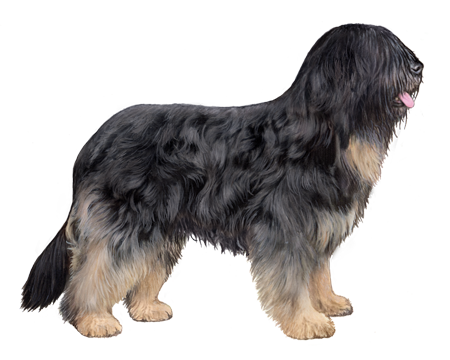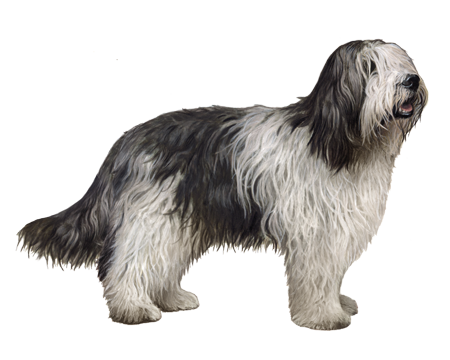
Pyrenean Shepherd Dog
The Pyrenean Shepherd is an affectionate, enthusiastic breed. These bundles of energy are always ready for outdoor adventures.
Interested in discovering if your dog is a Pyrenean Shepherd Dog?
Check out Wisdom Panel's DNA tests.

Pyrenean Shepherd Dog Traits
General Appearance
Pyrenean Shepherds are small, lean, sinewy dogs. These dogs are energetic, athletic dogs that move with flowing gaits and a mischievous attitude to match their stamina.
Pyrenean Shepherds are always on alert and ready for action.
Coat and Coloring
There are two different varieties of Pyrenean Shepherds: rough-faced and smooth-faced. Both varieties have hair that's almost flat or slightly wavy; their hair's texture is harsh and described as being between the wool of a sheep and the hair of a goat.
Rough-faced dogs have long or demi-long coats. Dogs with long hair have more furnishings, and their woollier hair may cord, especially on the elbows, rump, and thighs. Dogs with demi-long hair have culottes on their backsides.
On smooth-faced dogs, short, fine hairs cover the muzzle. It grows longer on the sides of the head, blending into a modest ruff. Smooth-faced Pyrenean Shepherds have fine, soft hair on their bodies that grows to a maximum of three inches long on the ruff and culottes and two inches long on the back.
Pyrenean Shepherds come in various shades of fawn from tan to copper, shades of grey from charcoal to silver to pearl grey, and merles of diverse tones. Their coats can also be brindle, black, and black with white markings (though the white should not cover more than 30 percent of their bodies).
Distinctive Physical Traits
These small dogs have long bodies with level backs; short, rounded loins; and sinewy forelegs. Their tails may be docked, natural bob, or long.
Pyrenean Shepherds have straight, narrow muzzles and can have cropped or uncropped ears that are wider at the base and stand erect. They have dark brown, almond-shaped, expressive eyes that lend an intelligent, alert, mischievous expression.
Pyrenean Shepherd Dog Temperament
Pyrenean Shepherds love to work. These intelligent, curious dogs have such strong herding instincts that they can often manage flocks without training from a shepherd or guidance from an experienced dog.
In the absence of work, Pyrenean Shepherds need other opportunities to channel their energy and owners must be prepared to provide plenty of exercise.
Pyrenean Shepherds develop strong attachments to their owners and want to be part of all activities; it's not a breed that wants to be left home while their families are out having fun.
They are loving, cheerful, and affectionate with those they know, but these dogs are also wary of strangers, making them ideal watchdogs.


Pyrenean Shepherd Dog History
Pyrenean Shepherds trace their origins back to the Pyrenees Mountains along the border between France and Spain. There, the dogs earned their name, navigating rugged terrain to move sheep between grazing areas.
According to local lore, Pyrenean Shepherds were the original dogs of cavemen who lived in the mountainous region. Historical accounts cite Pyrenean Shepherds and shepherds working side-by-side throughout Medieval times.
The dogs often worked in tandem with Great Pyrenees; the Great Pyrenees guarded flocks, and then the Pyrenean Shepherds moved them. During World War I, the small, surefooted breed worked in the military as couriers and search and rescue dogs.
Thanks to their skills during the war, Pyrenean Shepherds and Great Pyrenees lovers founded a club dedicated to the breeds' preservation: Reunion des Amateurs des Chiens Pyreneens. The French Kennel Club recognized the Pyrenean Shepherd as a breed in 1926.
Pyrenean Shepherd Dog Care
Nutrition
Feed Pyrenean Shepherds a high-quality dog food that is appropriate for their life stage (puppy, adult, senior). Consider a diet formulated for active breeds.
Portion out their food with a measuring cup and limit treats to no more than 10 percent of their daily calories to avoid overfeeding your Pyrenean Shepherd.
Grooming
Pyrenean Shepherds require regular grooming. Brush them once per week to keep their hair free of mats and tangles. Use a pin brush to remove dead undercoat, reduce shedding, and keep their coats looking their best.
Pyrenean Shepherds also need regular nail trims, ear cleanings, and a regular dental care routine that includes at-home teeth brushing and professional cleanings.
Exercise
These on-the-go dogs require a lot of exercise. In the absence of work, Pyrenean Shepherds enjoy walking, hiking, swimming, and other outdoor adventures that will help them burn off their abundant energy. Exercise is essential for their mental and physical health.
Pyrenean Shepherds also do well in dog sports such as obedience competitions, agility, and lure coursing.
Training
Pyrenean Shepherds are smart, active, and eager to please. They respond well to clicker training and other rewards-based training.
Teaching Pyrenean Shepherds basic commands and new tricks will provide mental stimulation that helps keep the breed happy and healthy.

Pyrenean Shepherd Dog Genetic Health Conditions
-
Chondrodystrophy (CDDY) and Intervertebral Disc Disease (IVDD) Risk
Chondrodystrophy (CDDY) is a skeletal disorder characterized by shortened limbs and abnormal early degeneration of the spinal discs, or intervertebral disc disease (IVDD), which predisposes to disc herniation.
Knowing if your Pyrenean Shepherd Dog is a carrier or at-risk for these conditions can help you and your veterinarian plan for your pup’s lifelong care. With Wisdom Panel™ Premium, you can get results for over 200 genetic health tests.
Breed Group
Herding
The herding group is a diverse category. These highly intelligent breeds were developed to guard and control the movement of livestock.
Resources
https://www.akc.org/dog-breeds/pyrenean-shepherd/
http://www.pyrshepclub.org/breed-info/history/
https://images.akc.org/pdf/breeds/standards/PyreneanShepherd.pdf
Reviewed July 26, 2020 by Cindy Elston, DVM, MPH


































































